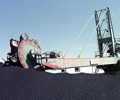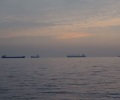Indonesian miners face constraints to supply restarting German coal plants

Indonesian thermal coal producers will face difficulty supplying the renewed European thermal coal demand, despite the significant premiums available in the market, as weather-related issues continue to hamper production.
German coal and lignite operators have started to prepare for a return of reserve units to the market, and the impending ban on Russian thermal coal has seen European demand spill over to other markets such as South Africa, Australia and even Indonesia despite the latter mostly producing coal with lower specifications than those required by European plants.
S&P Global Commodity Insights recently reported that German utilities RWE and EnBW have been preparing to run coal and lignite-based units currently in the grid reserve. However, Indonesian coal miners have flagged their “limited ability” to supply beyond their existing contractual obligations.
German energy minister Robert Habeck indicated June 19 that the government would trigger a request to run 1.9 GW of lignite and 4.3 GW of hard-coal capacity currently in the country’s security and grid reserves as soon as the draft law was approved by parliament, which could be July 8.
Supply and quality hurdles
An Indonesia-based producer pointed out that there is a significant gap in the quality of coal that is expected by European buyers and the grades that are produced in the country. “Indonesian suppliers who have specs that close to the European requirement might already have commitments to Northeast Asian buyers, which are their traditional customers.”
Another Indonesian miner said that they are currently focusing on normalizing production and will pursue new markets after the monsoons “subside hopefully in July”. “We have received inquiries from European nations but our ability to service them is limited by availability for the present due to bad weather affecting output,” the person said, adding that the priority for them is to meet domestic supply obligations and service backlogs against their existing contracts.
Bilateral talks
Despite these hurdles to supply the European market, Indonesia sellers could still be incentivized due to the significant premiums for CIF ARA delivery, which was assessed at a new record high of $417.50/mt on June 22, according to S&P Global data.
“The director general of coal and minerals has already talked to the German side (about coal imports),” Ministry of Energy and Mineral Resources spokesperson Agung Pribadi said.
S&P Global had reported earlier that Indonesian energy minister Arifin Tasrif had asked Germany’s Coal Importer Association [VDKi] in May to coordinate with other coal importers in Europe to ensure port availability and work out the standard terms and conditions for sourcing coal from Indonesia.
In the wake of the European ban on Russian coal, South Africa has so far appeared to benefit the most from European demand. However, prices at all major producing nations have remained elevated with Indonesian coal the cheapest current option.
According to S&P Global data, the price of Indonesian 4,200 kcal/kg GAR coal increased from $79.05/mt FOB Feb. 24, since the beginning of the Russia-Ukraine conflict, to $85.95/mt June 21.
During the same period, the price of South African 5,500 kcal/kg NAR rose from $231.9/mt FOB to $290.60/mt, while Australian 5,500 kcal/kg NAR price with 23% ash content increased from $159.25/mt FOB to $174.75/mt FOB.
Source: Platts

 Hellenic Shipping News Worldwide Hellenic Shipping News Worldwide, Online Daily Newspaper on Hellenic and International Shipping
Hellenic Shipping News Worldwide Hellenic Shipping News Worldwide, Online Daily Newspaper on Hellenic and International Shipping





















 PG-Software
PG-Software